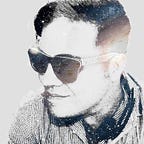Less than Zero, More than One
You started from the position of being a bunch of cells to being a living, breathing person, born into a family that has a history of its own problems and tragedies, and raised to follow whatever beliefs your parents and family instilled upon you. Your brain then goes through a feedback loop as it tries to build a worldview for itself, scrambling to put pieces together from experiences, anecdotes, and surroundings.
For all your high and mighty aspirations, you find yourself falling short of any ideal. The yardstick you were handed to measure yourself implies that you are fundamentally broken. It’s as if the natural processes that led to your creation were mostly misfires.
Somehow, you are the ugliest, dumbest, least helpful, least insightful, least useful waste of human flesh there ever was. Your nose is in the wrong place. You didn’t get good grades. You were too fat and gross. Your smile is asymmetrical because there’s a gap in your teeth.
Paradoxically, some part of you is beautiful beyond comparison. You’re often too busy hurting yourself to notice. You feel like you can understand many things without any real idea of how you know them. In your center lies a softness, a space all too happy to delve out compassion and love for the world.
You bear witness to injustice and cruelty, but are too paralyzed to do anything. Humans everywhere beat their chests in a primitive display of tribalism that reveals how little we’ve evolved. The loudest voices struggle to drown each other out in a chorus of anger. Division lines are drawn, and sometimes people die over it.
All we have is hunting, politics, religion, sports, sex, money, and warfare, all plastered in mental advertisements for the other corresponding things.
These tribes emerge in different arenas: iOS vs Android, Mac vs. PC, Ford vs Honda, Democrat vs Republican, Chicago vs Green Bay, Christianity vs Islam, Communism vs Capitalism. Both camps competitively push against one another, propping up their own heroes while highlighting the villains on the other side. One dynamic attempts to overpower its opposite, but neither makes much traction in the end.
Entire cosmologies and frameworks of ethics are forged in the process, and people love to remind each other that their own version of perception is the most correct one. Every tribe finds itself at war with its own opposite perspective. The irony, perhaps, is that many of these camps have more compatibility with one another than either is willing to admit.
Greater still is the notion that our very identities are comprised of an overlap of mindshare and symbolism stemming from our demographic roots. The self is constructed from millions of individual pieces, many of which are borrowed from someone else.
The brain puts together patterns that it believes makes the most sense, based on the what’s there. It insists that it is right, because its method of validation is based on what it thinks it understands.
To some, the pursuit of happiness can feel like a never-ending marathon with no real winners. The pursuit of money just makes you all the more thirsty for it, and the pursuit of truth is fraught with disappointment. You met with so-called spiritual gurus, only to discover that they were but plastic medicine men. Even the people you look up to will let you down.
Push that rock, Sisyphus, you tell yourself.
There are many reasons a person living in this world might want to end their own life. Someone has been struggling for too long — they are weighed down by the troubles of the world, and they are sickened by what they see in themselves and other people. Hopelessly trapped in agony over the world’s amount of pain and suffering.
To many, there is a strong case for choosing death over life. Such an action carries the weight of choice with meaning — in a chaotic and violent world, it can seem like an escape, drawing a curtain of misery to a definite close. Or at least, that’s how the assumption goes. Nobody really knows in the end.
The model of what a post-life experience looks like is poorly understood at best. Either you live forever, burn forever, are reborn forever, or just simply stop existing in any conscious form whatsoever. Other interpretations may include becoming a constellation, becoming the god of a world full of your spirit children, or learning a new way to say hoooo-ray with inter-dimensional gnomes.
You can try to make peace with the idea one way or another, but when the very foundations of your beliefs fail you, it can feel as if all cumulative systems of value ultimately cascade and collapse into nothing. The beginning and ending points are pretty much the same.
For all you know, you might just end up being nothing with no sense of continuity, and the same thing will happen to everyone you’ve ever known and ever loved.
In the end, all you can really do is try to make the most of your time, and appreciate it for what it is. Life is transient, and you are up against an advancing wall of death.
